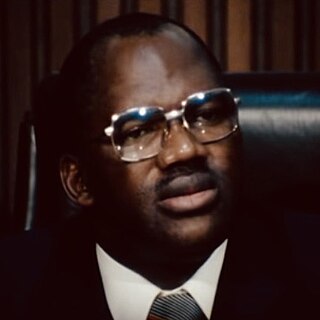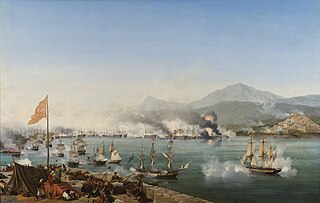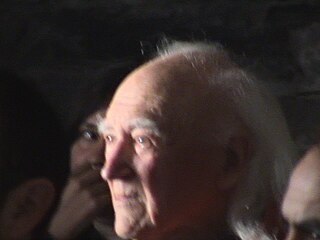Related Research Articles

French Algeria, also known as Colonial Algeria, was the period of Algerian history when the country was a colony and later an integral part of France. French rule lasted until the end of the Algerian War which resulted in Algeria gaining independence on 5 July 1962.

Samuel Shafiishuna Daniel Nujoma, is a Namibian revolutionary, anti-apartheid activist and politician who served three terms as the first President of Namibia, from 1990 to 2005. Nujoma was a founding member and the first president of the South West Africa People's Organization (SWAPO) in 1960. Before 1960, SWAPO was known as the Ovambo People's Organisation (OPO). He played an important role as leader of the national liberation movement in campaigning for Namibia's political independence from South African rule. He established the People's Liberation Army of Namibia (PLAN) in 1962 and launched a guerrilla war against the apartheid government of South Africa in August 1966 at Omugulugwombashe, beginning after the United Nations withdrew the mandate for South Africa to govern the territory. Nujoma led SWAPO during the lengthy Namibian War of Independence, which lasted from 1966 to 1989.

Hendrik Frensch Verwoerd, also known as H. F. Verwoerd, was a Dutch-born South African politician, scholar in applied psychology, philosophy, and sociology, and newspaper editor who was Prime Minister of South Africa. He is commonly regarded as the architect of apartheid and nicknamed the "father of apartheid". Verwoerd played a significant role in socially engineering apartheid, the country's system of institutionalized racial segregation and white supremacy, and implementing its policies, as Minister of Native Affairs (1950–1958) and then as prime minister (1958–1966). Furthermore, Verwoerd played a vital role in helping the far-right National Party come to power in 1948, serving as their political strategist and propagandist, becoming party leader upon his premiership. He was the Union of South Africa's last prime minister, from 1958 to 1961, when he proclaimed the founding of the Republic of South Africa, remaining its prime minister until his assassination in 1966.

Pieter Willem Botha, was a South African politician. He was the head of government of South Africa from 1978 to 1989, serving as the last prime minister of South Africa from 1978 to 1984 and the first executive state president of South Africa from 1984 to 1989.

Ahmed Ben Bella was an Algerian politician, soldier and socialist revolutionary who served as the head of government of Algeria from 27 September 1962 to 15 September 1963 and then the first president of Algeria from 15 September 1963 to 19 June 1965.

Lennox Leslie Wongama Ngweyesizwe Sebe was the chief minister of the Xhosa bantustan of Ciskei after its self-rule in 1972, and the nominally independent country's first president from 1983. He was the Chief of the AmaKhambashe Tribal Authority and his praise name (isikhahlelo) was Ngweyesizwe.

Wars of national liberation, also called wars of independence or wars of liberation, are conflicts fought by nations to gain independence. The term is used in conjunction with wars against foreign powers to establish separate sovereign states for the rebelling nationality. From a different point of view, such wars are called insurgencies or rebellions. Guerrilla warfare or asymmetric warfare is often utilized by groups labeled as national liberation movements, often with support from other states. The term "wars of national liberation" is most commonly used for those fought during the decolonization movement. Since these were primarily in the third world, against Western powers and their economic influence, and a major aspect of the Cold War, the phrase has often been applied selectively to criticize the foreign power involved.

The Algeria national football team represents Algeria in men's international football, and is governed by the Algerian Football Federation. The team plays their home matches at the 5 July Stadium in Algiers and Miloud Hadefi Stadium in Oran. Algeria joined FIFA on 1 January 1964, a year and a half after gaining independence. They are the current champions of the FIFA Arab Cup.

The decolonisation of Africa was a series of political developments in Africa that spanned from the mid-1950s to 1975, during the Cold War. Colonial governments gave way to sovereign states in a process often marred by violence, political turmoil, widespread unrest, and organised revolts. Major events in the decolonisation of Africa included the Mau Mau rebellion, the Algerian War, the Congo Crisis, the Angolan War of Independence, the Zanzibar Revolution, and the events leading to the Nigerian Civil War.

Apartheid was a system of institutionalised racial segregation that existed in South Africa and South West Africa from 1948 to the early 1990s. It was characterised by an authoritarian political culture based on baasskap, which ensured that South Africa was dominated politically, socially, and economically by the nation's minority white population. Under this minoritarian system, white citizens held the highest status, followed by Indians, Coloureds and black Africans, in that order. The economic legacy and social effects of apartheid continue to the present day, particularly inequality.
The word banlieue, which is French for "suburb", does not necessarily refer to an environment of social disenfranchisement. Indeed, there exist many wealthy suburbs, such as Neuilly-sur-Seine and Versailles outside Paris. Nevertheless, the plural term banlieues has often been used to describe troubled suburban communities—those with high unemployment, high crime rates, as well as frequently, a high proportion of residents of foreign origin mainly from former French African colonies and therefore Berbers, sub-saharan Africans, Caribbeans, Portuguese, Spanish and Arabs.
The African independence movements took place in the 20th century, when a wave of struggles for independence in European-ruled African territories were witnessed.

Israel–South Africa relations refer to the current and historic relationship between the Republic of South Africa and the State of Israel. As of January 2024, South Africa maintains only “limited political and diplomatic interaction” with Israel due to the ongoing Israeli–Palestinian conflict.

Disinvestmentfrom South Africa was first advocated in the 1960s in protest against South Africa's system of apartheid, but was not implemented on a significant scale until the mid-1980s. A disinvestment policy the U.S. adopted in 1986 in response to the disinvestment campaign is credited with playing a role in pressuring the South African government to embark on negotiations that ultimately led to the dismantling of the apartheid system.
The Agreement among the People's Republic of Angola, the Republic of Cuba, and the Republic of South Africa granted independence to Namibia from South Africa and ended the direct involvement of foreign troops in the Angolan Civil War. The accords were signed on 22 December 1988 at the United Nations Headquarters in New York City by the Foreign Ministers of People's Republic of Angola, Republic of Cuba and Republic of South Africa.

Constructive engagement was the name given to the conciliatory foreign policy of the Reagan administration towards the apartheid regime in South Africa. Devised by Chester Crocker, Reagan's U.S. Assistant Secretary of State for African Affairs, the policy was promoted as an alternative to the economic sanctions and divestment from South Africa demanded by the UN General Assembly and the international anti-apartheid movement. Among other objectives, it sought to advance regional peace in Southern Africa by linking the end of South Africa's occupation of Namibia to the end of the Cuban presence in Angola.

Foreign relations of South Africa during apartheid refers to the foreign relations of South Africa between 1948 and 1994. South Africa introduced apartheid in 1948, as a systematic extension of pre-existing racial discrimination laws. Initially the regime implemented an offensive foreign policy trying to consolidate South African hegemony over Southern Africa. These attempts had clearly failed by the late 1970s. As a result of its racism, occupation of Namibia and foreign interventionism in Angola, the country became increasingly isolated internationally.

Enuga Sreenivasulu Reddy, also known as E. S. Reddy, was an Indian-born diplomat at the United Nations who led the anti-apartheid efforts at the UN's Special Committee Against Apartheid and its Centre Against Apartheid. He also served as director of the UN Trust Fund for South Africa and the Educational and Training Programme for Southern Africa. During his time in these roles, he campaigned for economic boycott of the then Government of South Africa, advancing anti-apartheid actions including a combination of economic and social measures. He also lobbied for the release of the imprisoned leader Nelson Mandela.

René Vautier was a French film director. His films, which were often controversial with French authorities, addressed many issues, such as the Algerian War, French colonialism in Africa, pollution, racism, women's rights, and apartheid in South Africa. Many were banned or condemned, and one caused him to go to prison for a year.

Pelecopsis is a genus of dwarf spiders that was first described by Eugène Louis Simon in 1864.